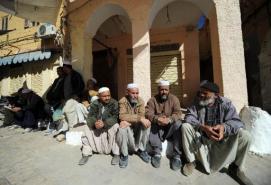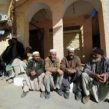
BRIEFS
Publication: Terrorism Monitor Volume: 12 Issue: 3
By:

BERBER-ARAB CLASHES IN ALGERIA’S M’ZAB VALLEY
Andrew McGregor
The ongoing Berber cultural revival in North Africa has gone hand-in-hand with a new political assertiveness. In nations such as Libya, Algeria and Mali, this has at times resulted in armed clashes and protests demanding linguistic rights and political recognition of Berber (Amazigh) communities. The latest of these confrontations is now underway in the south Algerian oasis of Ghardaïa, where Chaamba Arabs have clashed repeatedly with the indigenous Mozabite Berbers, forcing Algiers to send security forces to restore law and order in the region.
Communal violence broke out in May 2013 following an alleged attempt by Chaamba Arabs to use forged property records to take over a Mozabite cemetery (Algérie Presse Service, May 8, 2013). The dispute degenerated into sword-wielding youth gangs throwing petrol bombs at each other in the streets of Ghardaïa, the largest city in the M’zab Valley. Shops were also burned in Berriane as the violence spread to the other cities of the M’zab (El-Watan [Algiers], January 26).
For years, Berbers have accused the Algerian Gendarmerie Nationale of pro-Arab bias and even of encouraging Arab rioters, charges that seemed to have been confirmed when three officers were suspended after a video emerged showing their participation in violence that resulted in the death of a young Berber (AP, January 29). According to a local Mozabite activist, “We are Algerian citizens first. We want justice and the truth to be told about what happened in Ghardaïa and that crimes be punished. Those officers whose bias has been proven need to be punished. We say no to violence, no to impunity, yes to tolerance” (El-Watan [Algiers], January 26).
Violent clashes between the Arab and Berber communities in Berriane began in March 2008 and continued at lesser levels throughout that year until mass violence broke out again in April 2009 (El-Khabar [Algiers], May 20, 2008; Tout sur l’Algerie, April 17, 2009). Heated protests against endemic unemployment in the midst of an oil-producing region were common in the first half of 2013, reflecting growing tensions in the area. Much of the violence has been carried out by youth gangs from the Berber and Arab communities.
The fighting pits the Chaamba Arabs, who follow the Maliki madhab (one of the four orthodox schools of Islamic jurisprudence) and the Mozabite Berbers, who follow the non-orthodox Ibadite form of Islam. Ibadite Islam is a more moderate offshoot of the early Islamic Kharijite movement, whose advocacy of jihad against rulers they deemed insufficiently Islamic led to nearly two centuries of conflict in the Islamic world. The Ibadite movement retained a socially conservative attitude with an emphasis on the Quran and a more tolerant attitude towards other forms of Islam. Most remaining Ibadites are found in Oman, but smaller communities can be found in isolated oases and islands in Libya, Tunisia, Algeria and Zanzibar. Mozabite conservatism is now under stress from both young Mozabites who have been educated elsewhere and from new non-Mozabite arrivals in the M’zab Valley. Despite the insularity of the Mozabite community, the Mozabites have built a commercial network linking the M’zab with the cities of the Mediterranean coast.
The Berbers of the M’zab can trace their lineage back to the regional Berber capital of Tiaret in northern Algeria. When Tiaret was taken by the Fatimid Shiites in 933, Ibadi Berbers began to move south, first to Ourgla Oasis, and finally on to M’zab in the early 11th century. They were followed by other Ibadi Berbers escaping pressure from new waves of Arab tribesmen arriving from the Arabian Peninsula (particularly the Banu Hillal). Ghardaïa, the largest city in the M’zab with over 90,000 residents, was first settled in 1097. The valley is now home to over 400,000 people. The traditionally nomadic Chaamba began settling in the M’zab oases one hundred years ago, a process that has been accelerated in recent decades by the growth of the petroleum industry, loss of pastures and government discouragement of nomadic lifestyles. The two communities have never integrated in M’zab. Whenever communal violence breaks out, both communities typically blame the other. However, despite sectarian and ethnic differences between the Berbers and Arabs, many residents claim the fighting is actually being fuelled by rivalries between drug smuggling networks working in the area (AFP, January 30).
The M’zab consists of seven cities about 600 kilometers south of Algiers, including a cluster of five in the south (the “pentapolis”); Ghardaïa, al-Atteuf, Melika, Bani Isguen and Bounoura, with two other more isolated communities, Berriane and Guerrara, lying further north. The strategic location of the M’zab Valley at the upper edge of the Sahara desert made it an important crossroads for various trans-Saharan trade routes. After the arrival of the French in Algeria in the mid-19th century the Mozabites paid a tribute in exchange for autonomy, but the entire region was eventually annexed by France in 1882.
Aside from the death of three Mozabites in the latest sectarian violence, the most shocking development was the Chaamba destruction of the tomb of Amir Moussa, a UNESCO designated world heritage site (Agence Kabyle d’Information, January 14). The Amir was a Mozabite leader of the 16th century who is ironically remembered for leading efforts to integrate the Arab nomads into the M’zab community in 1586 (AFP, January 30). The ancient Mozabite cemetery in Ghardaïa was also destroyed by marauding Arab youths.
On January 27, Mozabite activist Dr. Kameleddine Fekhar issued a statement, purportedly speaking on behalf of the Mozabite community that demanded the departure of the Abd al-Malik Sellal government and urged a boycott of April’s upcoming presidential election. The statement complains of the “racist aggression” of police-supported militias armed with swords and knives that pillage and burn at will. Arrests followed by torture are determined solely on a racial basis, according to the statement (Siwel – Agence Kabyle d’Information, January 29). Prime Minister Sellal visited M’zab in January when tensions seemed to be easing, but fighting erupted with new intensity only days after his departure.
SALAFIST AL-NUR PARTY STRUGGLES TO KEEP POLITICAL ISLAM ALIVE IN EGYPT
Andrew McGregor
With former president Muhammad Mursi in prison and the Muslim Brotherhood declared a terrorist organization, political Islam is struggling to survive in Egypt today. With the Brotherhood’s Freedom and Justice Party (FJP) expelled from the political scene, the Islamist torch has passed to the Salafist Nur Party, led by Younes Makhioun. The party, established in 2011 by Egypt’s Dawa al-Salafiya (Salafist Call) movement (a Salafist rival to the Muslim Brotherhood since the 1970s), took nearly a quarter of the vote in the 2011 parliamentary elections after forming a coalition with three smaller Salafist parties, making it the second-most powerful Islamist party in Egypt after the Muslim Brotherhood’s FJP. The party endured a bitter split in December 2012 over the role of al-Dawa al-Salafiya clerics in daily decision-making in the Nur Party (see Terrorism Monitor, January 25, 2013).
During the short rule of the Muslim Brotherhood’s FJP, the Nur (“Light”) Party did not provide the automatic support to the Brotherhood’s initiatives that many expected, preferring to set its own course to avoid being too closely identified with the Brothers. The party was prominent in its support of the military takeover in July 2013, a move taken to avoid political isolation. This political strategy effectively saved the Nur Party from the fate that met the Brotherhood. Party leader Makhioun believes the Brotherhood’s confrontational approach propelled its downfall:
The Nur Party joined the Grand Imam of al-Azhar and Coptic Pope Tawadros II in calling on Egyptians to participate in January’s constitutional referendum, saying it served “the interests of the homeland and the goals of Islamic law” (Daily News Egypt, January 11). Though the referendum approved the new constitution with an astonishing 98.1 percent of the vote, turnout was only 39 percent, too low for the vote to be regarded as a firm endorsement by the Egyptian people. Campaigning for a “no” vote was officially discouraged and a “yes” vote was presented as the only way to restore stability to Egypt. The vote was boycotted by supporters of the Muslim Brotherhood and turnout by Nur Party loyalists was low in support of a new constitution that has discarded most of the Islamic language that the party had lobbied for before the downfall of the Muslim Brotherhood government. Nur Party support for the new constitution seemed surprising, given that one of its articles bans religion-based political parties, but Yasser Borhami, deputy head of al-Dawa al-Salafiya, insists that the Nur Party is protected by the second article of the constitution, which states that Shari’a is the main source of legislation in Egypt (al-Arabiya, January 9).
Approval of the new constitution is widely viewed as being the first step in a run for the presidency by armed forces commander-in-chief Field Marshal Abd al-Fattah al-Sisi. The Nur Party is not expected to field a candidate for the presidency, citing the Brotherhood’s “failed experiment,” though the party is not prepared to support al-Sisi’s candidacy until “fuller explanations” are given of the public bloodshed that followed the military coup, particularly the massacre of Muslim Brotherhood supporters at northern Cairo’s Raba’a al-Adawiya mosque (Reuters, January 23). The government established a commission to investigate the incidents on January 6, though it is not expected to report its findings for six months.
The Nur Party publicly rejects partisan politics and prefers the establishment of strong state institutions over the creation of strongman figures who will inevitably disappoint. Makhioun condemns the Brotherhood’s attempt to monopolize power, favoring a more inclusive style of government:
The Party avoided any sign of support for Mursi after he was deposed last year and appears to be shifting slightly towards the political center, though such a move risks losing the party’s highly-conservative core supporters. According to Yasser Borhami, deputy head of al-Dawa al-Salafiya: “We have won respect from the people for our moderate positions… Maybe we lost some support from within the Islamic movement, but many have admired the party’s policies” (Reuters, January 23).
Nur Party leader Makhioun nonetheless believes that there is still a potential pool of support for political Islam in Egypt, despite the performance of the Brotherhood’s FJP:





